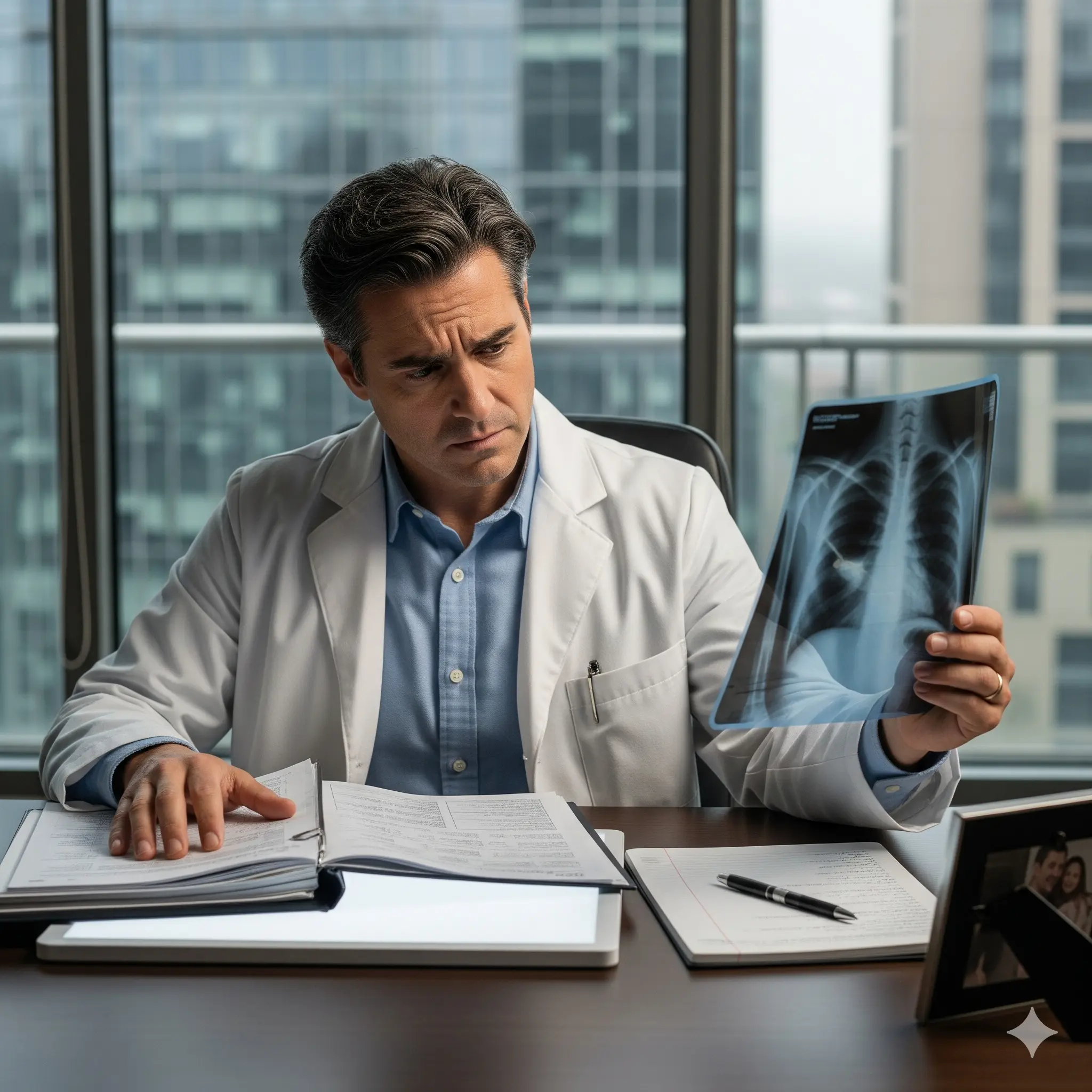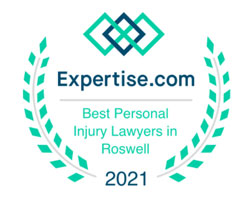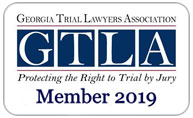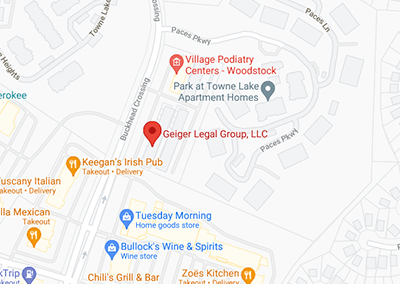Canton Catastrophic Injury Lawyer

Georgia Catastrophic Injury Lawyer
Have you or a loved one suffered a life-altering injury in a serious accident? When an injury is so severe that it permanently changes a person’s life, it is considered catastrophic. If you are facing this reality, you need an experienced Georgia catastrophic injury lawyer with a proven track record of handling high-stakes catastrophic injury cases. The physical injuries, emotional trauma, and financial burdens can be overwhelming. Navigating the legal process alone is nearly impossible when you are dealing with a powerful insurance company.
At Geiger Legal Group, LLC, our law firm understands the immense challenges you face. We are here to manage your catastrophic injury claim and fight the insurance company on your behalf. Our legal team works tirelessly to hold the negligent party accountable, allowing you to focus on healing. We invite you to schedule a free consultation to discuss your legal options.
What Qualifies as a Catastrophic Injury in Georgia?
Catastrophic injuries are severe, life-altering events that result in permanent disability, disfigurement, or long-term medical conditions. Unlike minor injuries, these often prevent the injured person or injured party from returning to work or performing daily activities. Under Georgia law, these cases require a deep understanding of both medical and legal complexities to ensure victims receive the compensation they need for a lifetime of care.
Common examples of catastrophic injuries include:
- Traumatic Brain Injury (TBI): A severe brain injury can impair cognitive function, motor skills, and emotional regulation, often requiring lifelong assistance. The effects can range from memory loss and personality changes to a permanent vegetative state.
- Spinal Cord Injuries: Damage to the spinal cord can lead to partial or complete paralysis, such as paraplegia or quadriplegia. This permanently alters a person’s mobility and independence.
- Burn Injuries: Severe burn injuries often require extensive surgeries, including skin grafts, cause permanent scarring and disfigurement, and carry a high risk of life-threatening infections.
- Amputations: The loss of a limb is a permanent disability that requires significant medical treatment, prosthetic fittings, and extensive physical therapy to adapt to a new way of life.
- Internal Organ Damage: Severe trauma from accidents involving vehicles or falls can cause lasting damage to internal organs, affecting critical bodily functions for a lifetime and requiring ongoing medical treatment.
Common Causes Handled by a Georgia Catastrophic Injury Lawyer
A thorough investigation is critical to determine the cause of the accident and identify all liable parties. Our attorneys are experienced in handling complex cases arising from various incidents, including sports injuries.
Truck Accidents
A truck accident involving a commercial vehicle like a tractor trailer or big rig is a primary cause of catastrophic harm. The sheer size and weight difference between a large truck and a passenger vehicle means that collisions are often devastating.
The Complexity of Truck Accident Law
Truck accident law is complex, involving a web of federal and state law regulations that govern the trucking industry. Violations of these rules, such as those related to hours-of-service for a truck driver, can be a key factor in proving negligence. Truck accident cases often involve multiple liable parties beyond just the driver. This can include the trucking company for negligent hiring or improper maintenance, the cargo loader for unsecured freight, or even equipment manufacturers for defective parts. We have the resources to take on accidents involving any large commercial vehicle, including a dump truck or a garbage truck.
Common Causes of Tractor Trailer and Big Rig Accidents
Many factors can lead to a devastating truck accident. Our truck accident attorneys investigate every possibility, including:
- Truck Driver Fatigue: Federal regulations limit how many hours a truck driver can be on the road, but these rules are often violated.
- Improper Cargo Loading: An unbalanced or overloaded tractor trailer can easily lose control.
- Poor Maintenance: A trucking company is responsible for keeping its fleet in safe working order. Brake failure or tire blowouts on a big rig can be catastrophic.
- Distracted or Impaired Driving: A truck driver who is texting, intoxicated, or otherwise not paying attention puts everyone on the road at risk.
Critical Evidence Our Truck Accident Attorneys Pursue
Our truck accident attorneys understand the critical importance of preserving evidence that can provide vital information about the truck’s speed and braking in the moments before another truck accident. This includes:
- Securing driver logs and electronic logging device (ELD) data
- Vehicle maintenance and inspection records
- Data from the truck’s “black box” (Electronic Control Module)
- Cargo and weight manifests
- The truck driver’s employment and training history
Medical Malpractice
When we place our trust in medical professionals, we expect a certain standard of care. When that standard is violated, the result can be a devastating case of medical malpractice. This form of medical negligence occurs when a doctor, surgeon, hospital, or other healthcare provider causes an injury to a patient through a negligent act or omission. The consequences can lead to severe, lifelong injuries or even death.
Types of Medical Malpractice Claims We Handle
A medical malpractice lawsuit can arise from various situations where a medical error leads to harm, including:
- Surgical Errors: Mistakes made during surgery, such as operating on the wrong body part, leaving a foreign object inside a patient, or causing nerve damage.
- Misdiagnosis or Delayed Diagnosis: A failure to correctly diagnose a condition like cancer or heart disease in a timely manner, leading to a worse outcome.
- Birth Injuries: Negligence during labor and delivery that results in conditions like cerebral palsy or Erb’s palsy.
- Anesthesia Errors: Administering too much or too little anesthesia, or failing to monitor a patient’s vital signs properly.
- Medication Errors: Prescribing the wrong medication or an incorrect dosage.
Understanding Medical Malpractice Law and Liability
Proving a medical malpractice claim in Georgia is exceptionally complex. It requires an in-depth review of extensive medical records and, crucially, testimony from qualified medical experts to establish that a breach of the professional standard of care occurred. Medical malpractice law in Georgia also has specific procedural requirements, such as filing an “Affidavit of Merit” from a qualified expert along with the initial lawsuit.
Our law firm has the experience to navigate these intricate requirements. We handle malpractice claims with the sensitivity and diligence they deserve, working to hold providers and institutions accountable for their medical malpractice liability. Pursuing a medical malpractice action is not just about compensation; it is a critical step toward securing justice and preventing similar errors from harming other patients. We consult with experts and refer to guidelines from bodies like the American Medical Association to build the strongest case possible. This dedication to detail is crucial in any medical malpractice case.
Compensation in a Catastrophic Injury Claim
Victims of catastrophic injuries are entitled to seek compensation for the full range of their losses. Our goal is to secure a fair settlement that provides for your needs, both now and in the future.
Damages in personal injury claims typically include:
- Economic Damages: These are the tangible financial costs associated with the injury. This includes current and future medical expenses and medical bills, the cost of ongoing medical treatment and medical care, the necessity for future medical care, lost wages, and diminished earning capacity.
- Non-Economic Damages: These damages compensate for the profound, personal losses that don’t have a specific price tag. Non-economic damages cover pain and suffering, emotional distress, and loss of enjoyment of life.
Understanding a Wrongful Death Claim in Georgia
In the most tragic catastrophic injury cases, an accident can lead to the death of a loved one. When this happens, surviving family members may be able to file a wrongful death claim. This type of lawsuit seeks to hold the negligent party accountable for the death and recover damages for the losses the family has suffered. A wrongful death claim is a distinct legal action that addresses the profound impact of losing a family member and provider.
Who Can File a Wrongful Death Lawsuit in Georgia?
Georgia law specifies who is eligible to file a wrongful death claim, following a strict hierarchy:
- Surviving Spouse: The spouse of the deceased has the primary right to file.
- Surviving Children: If there is no surviving spouse, the right passes to the children of the deceased.
- Surviving Parents: If there is no spouse or child, the surviving parent(s) may file a claim.
- Personal Representative: If there are no immediate family members, the personal representative of the deceased’s estate can file the claim on behalf of the next of kin.
Damages in a Wrongful Death Claim
The purpose of a wrongful death claim is to secure compensation for the “full value of the life of the decedent,” as defined by state law. This includes both tangible and intangible losses. Damages can cover:
- Economic Losses: This includes the loss of future income, benefits, and other financial support the deceased would have provided.
- Loss of Companionship: Compensation for the loss of care, companionship, and guidance the deceased provided to the family.
- Funeral and Burial Expenses: The costs associated with the deceased’s final arrangements.
- Medical Expenses: Any medical bills incurred by the deceased as a result of the final injury before their death.
It is a complex legal action that requires a compassionate yet aggressive approach from an experienced law firm.
Navigating the Legal Process
The legal process for a catastrophic injury claim is complex and requires meticulous attention to detail. Our attorneys guide clients through every stage, ensuring their rights are protected. Georgia does not operate under a no-fault system for most accidents, meaning proving fault is essential, and some cases may even involve the interpretation of laws passed by state legislatures.
Step 1: Thorough Investigation and Evidence Gathering
The foundation of a strong claim is a thorough investigation. We immediately gather evidence to build your case, which includes:
- Securing Accident Reports: Obtaining official police or incident reports that document the event.
- Collecting Witness Statements: Interviewing witnesses while their memories are fresh to get clear accounts of what happened.
- Analyzing Medical Records: Compiling and reviewing all medical records to document the full extent of your physical injuries and the required medical treatment.
- Identifying Liable Parties: We identify every negligent party, from individuals to corporations, and all applicable liability insurance and insurance policies. Understanding Georgia’s specific auto insurance laws is a key part of this step.
Step 2: The Discovery Process
Once a lawsuit is filed, both sides engage in the discovery process, a formal stage of information exchange. Our attorneys manage this intensive phase, which can take many hours of dedicated work. Key components include:
- Interrogatories: Written questions sent to the other parties involved, which they must answer under oath.
- Requests for Production: Demands for relevant documents, such as maintenance logs in a truck accident case or internal reports.
- Depositions: Formal, out-of-court interviews where witnesses and parties involved provide sworn testimony.
Step 3: Negotiation and Litigation
After building a strong case through investigation and discovery, we enter into negotiations with the insurance company. Our goal is to secure a fair settlement that covers all your damages without the need for a trial. However, if the insurance company refuses to offer an acceptable amount, we are fully prepared to take your case to court. We will cross-examine witnesses and present a compelling case to a jury to fight for the compensation you deserve.
Statute of Limitations for Personal Injury Lawsuits in Georgia
Most personal injury lawsuits are resolved through settlements, without anyone ever seeing the inside of a courtroom. But in some high-value injury cases – including many catastrophic injury cases – a victim’s attorney may resort to stronger measures to obtain full and fair compensation. Like all states, Georgia has a statute of limitations that imposes strict deadlines on how long you have to file a personal injury lawsuit. For most injury cases, you have two years from the date when the injury occurred to sue. If you miss the two-year deadline, you could lose your right to pursue compensation in civil court. This is why it is essential to find a trusted catastrophic injury lawyer in Georgia who can identify important deadlines and keep your case on track.
Why You Need an Experienced Georgia Law Firm for Catastrophic Injury Cases
Choosing the right law firm is critical after a life-altering accident. Insurance companies have vast resources and teams of lawyers dedicated to minimizing their payouts. An unrepresented injured party is at a significant disadvantage against these corporations. Our role is to level the playing field. We handle all catastrophic injury cases on a contingency fee basis, which means you pay absolutely no attorney’s fees unless we win your case. This arrangement allows you to access top-tier legal representation without any upfront financial risk.
Our legal team provides comprehensive support through every step of your personal injury case:
- We Conduct a Comprehensive Investigation: We go far beyond the initial accident reports. Our team will work diligently with a network of experts, including accident reconstructionists, medical specialists, and financial analysts, to build an undeniable case that proves liability and documents the full extent of your damages.
- We Handle All Communication: You can focus on your recovery while we handle all communication with the insurance company, creditors, and other parties. We act as your shield, protecting you from the pressure and tactics used by insurance adjusters whose goal is to settle your claim for as little as possible.
- We Build a Case Based on Expert Analysis: We work with leading medical and financial experts to accurately calculate the true cost of a catastrophic injury. This includes projecting the costs of future medical care, lost earning capacity, and the immense personal toll of the injury. This detailed analysis is crucial for securing a settlement that will provide for you for the rest of your life.
- We Fight Tirelessly for Maximum Compensation: Our attorneys are skilled negotiators and formidable trial lawyers. We prepare every case as if it is going to trial, which often convinces the insurance company to offer a fair settlement in a timely manner. If not, we are fully prepared to present your case to a jury and fight for the maximum compensation you deserve.
Frequently Asked Questions
What are the 4 criteria for medical malpractice in Georgia?
To have a valid medical malpractice case in Georgia, you must prove four specific legal elements. The failure to establish any one of these can result in a case being dismissed.
- A Duty of Care Existed: You must first establish that a formal doctor-patient relationship existed. This duty is created when a healthcare professional agrees to treat you, whether in a hospital, clinic, or other medical setting. This establishes their legal obligation to provide competent care.
- The Duty Was Breached: You must prove that the medical provider failed to meet the accepted standard of care. This is a form of medical negligence. In Georgia, the standard of care is defined as the level of skill and care that a reasonably prudent and competent healthcare provider in the same specialty would have provided under similar circumstances. Proving this almost always requires testimony from a medical expert who can explain to a jury what should have been done.
- The Breach Caused the Injury: It is not enough to show that a doctor made a mistake. You must also prove a direct link between that specific breach of duty and the injury you sustained. This is known as causation. It means demonstrating that “but for” the doctor’s negligence, your injury would not have occurred or would have been less severe.
- Resulting Damages: You must have suffered actual harm that can be compensated financially. This includes not just physical pain, but also quantifiable losses. Damages can include additional medical bills for corrective surgeries, ongoing therapy, lost wages from being unable to work, and non-economic damages for pain and suffering.
What is the average personal injury claim?
There is no official “average” settlement amount for a personal injury case in Georgia, as the value of each claim is highly specific to the individual circumstances. A case involving minor soft-tissue injuries might settle for a few thousand dollars, whereas catastrophic injury cases involving permanent disability can result in settlements or verdicts worth millions. According to the Bureau of Justice Statistics, while the majority of personal injury cases are resolved through out-of-court settlements, the final value is always dependent on unique factors like the severity of the injury, total medical costs, and the long-term impact on the victim’s life and income.
How much should I ask for in my settlement?
You should never ask for a specific settlement amount without a complete and professional evaluation of your case. Determining how much to ask for is a strategic legal calculation, not a guess. The initial demand sent to an insurance company is a carefully crafted figure based on a detailed assessment of all current and future damages. Our legal team will first conduct a thorough investigation, which includes gathering all medical records, consulting with experts to understand your future needs, and calculating all economic and non-economic losses before presenting a formal demand that reflects the true and full value of your claim.
What is an acceptable settlement offer?
An “acceptable” settlement offer is one that fully and fairly compensates you for all of your economic and non-economic damages. It is crucial to remember that this includes not just your current bills, but also the anticipated future costs associated with your injury. An initial offer from an insurance company may seem substantial, but it could be deeply inadequate if it fails to account for a lifetime of medical care, lost earning capacity, or significant pain and suffering.
Key factors we use to evaluate whether an offer is acceptable include:
- Total Medical Expenses: This includes all past, current, and projected future costs for surgeries, rehabilitation, medication, and in-home care.
- Lost Income and Earning Capacity: We calculate not only the wages you have already lost but also the impact the injury will have on your ability to earn a living in the future.
- Pain and Suffering: We place a value on the physical and emotional trauma you have endured and will continue to endure.
- Liability and Fault: The strength of the evidence proving the other party was negligent is a critical factor in negotiations.
- Insurance Policy Limits: The maximum amount of available coverage from the at-fault party’s insurance policy can influence the final settlement figure.
Our attorneys will carefully analyze every offer from the insurance company to ensure it meets your long-term needs before advising you to accept.
Schedule a Free Consultation With a Georgia Catastrophic Injury Lawyer Today
If you or a loved one has suffered a catastrophic injury, do not wait. Contact the experienced Georgia catastrophic injury lawyer team at our law office. We are here to help you understand your rights and pursue the justice you deserve.
Call us today for a free consultation to discuss your case.














